
Regroovable tyre
Un pneu en phase de recreusage en usine
TYRE REGROOVING: REVAMP TREAD PATTERNS TO PROLONG TYRE LIFE
WHAT IS TYRE REGROOVING?
Regrooving involves removing rubber from the layer of existing rubber to restore tread pattern depth.
The technique is recommended by the European Tyre and Rim Technical Organisation (ETRTO). Right from the design stage, Michelin provides a sufficient thickness of rubber to allow regrooving without adversely affecting the tyre strength of robustness.
WHICH TYRES ARE “REGROOVABLE TYRES”?
All MICHELIN tyres applicable for regrooving, are marked "REGROOVABLE" of the tyre sidewall. As example, the MICHELIN X® MULTI Z2 regrooving truck tyres.
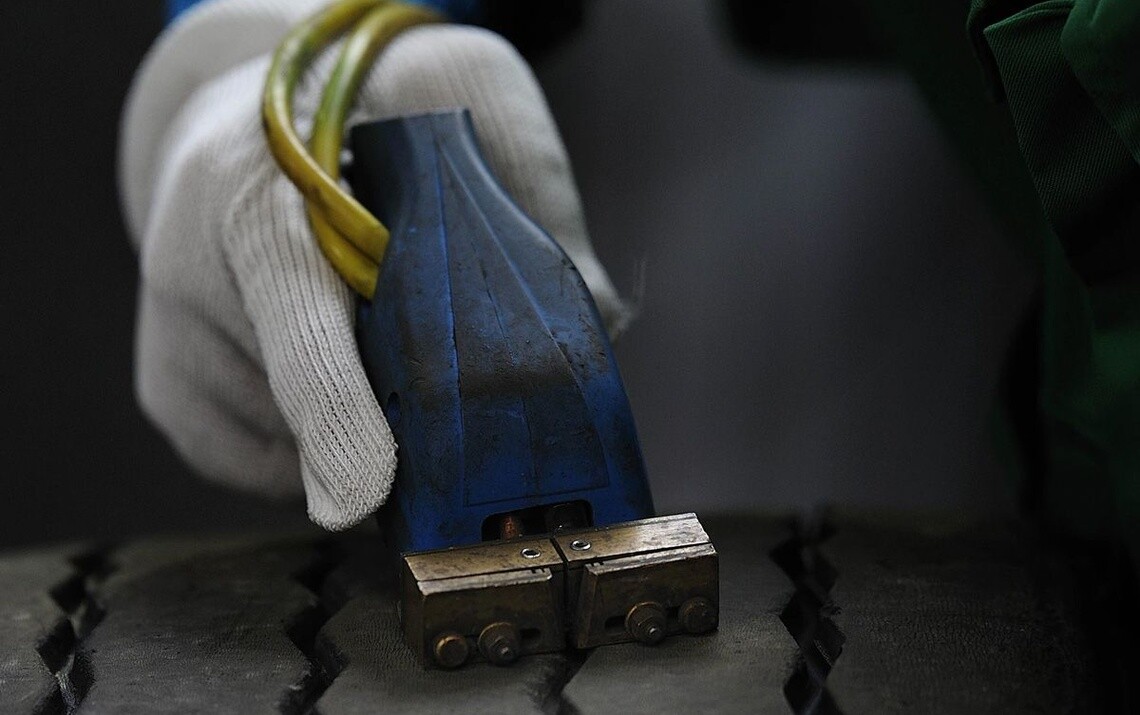
Tyre regrooving
WHAT ARE THE BENEFITS OF TYRE REGROOVING?

Regrooving benefit: longer life
Extended life
Regrooving extends the potential life of both new Michelin tyres and Michelin Remix® tyres by restoring tread depth, delivering on average an increased mileage potential of up to 25%(1).
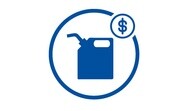
Regrooving benefit: fuel efficiency savings
Fuel efficiency
Up to 5% less fuel(2). Regrooving, done when a tyre’s rolling resistance is at its lowest, also improves fuel consumption. The up to 25% additional mileage offered by regrooving is created in the period when consumption is at its lowest.
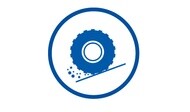
Regrooving benefit: extra grip
Increased grip
Improve grip, increase safety. Regrooving restores tread depth, leading to improved grip and safety on the road. On wet roads, regrooved tyres improve transverse grip and traction by around 10% compared to similarly worn non-regrooved tyres(3).

Regrooving benefit: Reduce your environmental footprint
Reduce your environmental footprint
Regrooving extends the life of your tyre when it is using the least amount of fuel. This allows you to save up to 251 kg of CO2.(4)
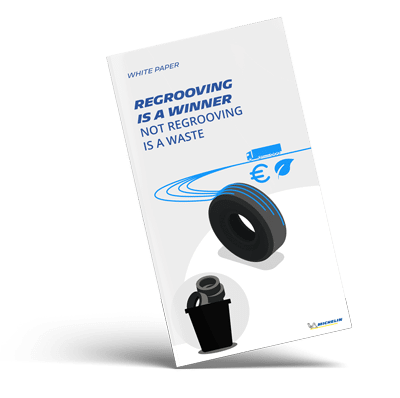
Regrooving white paper
FREE TYRE REGROOVING EBOOK
In this e-book, you will find all the essential information on regroovable tyres.
HOW TO REGROOVE TYRES?
REGROOVING PROCCESS
Regrooving when 2 to 4 mm of tread depth remains makes it possible to:
- Reproduce the tread pattern
- Ajust the regrooving depth so as to always retain a tread thickness of at least 2 mm between the bottom of the tread pattern and the plies when the tyre does not have a depth indicator.
Excessively deep regrooving can:
- Cause damage leading to the premature destruction of the tyre
- Jeopardise approval for retreading
- Reveal the plies in the bottom of the tread pattern, which makes the tyre non-compliant with the law
Do not regroove if:
The tread presents serious signs of damage: holes, scratches, cuts, stripping, etc. In this case there is a risk that metal plies will rust: this type of damage can cause the tyre to deteriorate rapidly when in use, potentially causing a sudden blow-out.
MICHELIN REGROOVE PATTERNS
To assist you with regrooving, we provide you with all the regrooving patterns suited to each tyre range, according to the specific features of their tread. You will find these patterns and more information on carrying them out (blades, depths, etc.) in the technical information section of each regroovable tyre's product page.
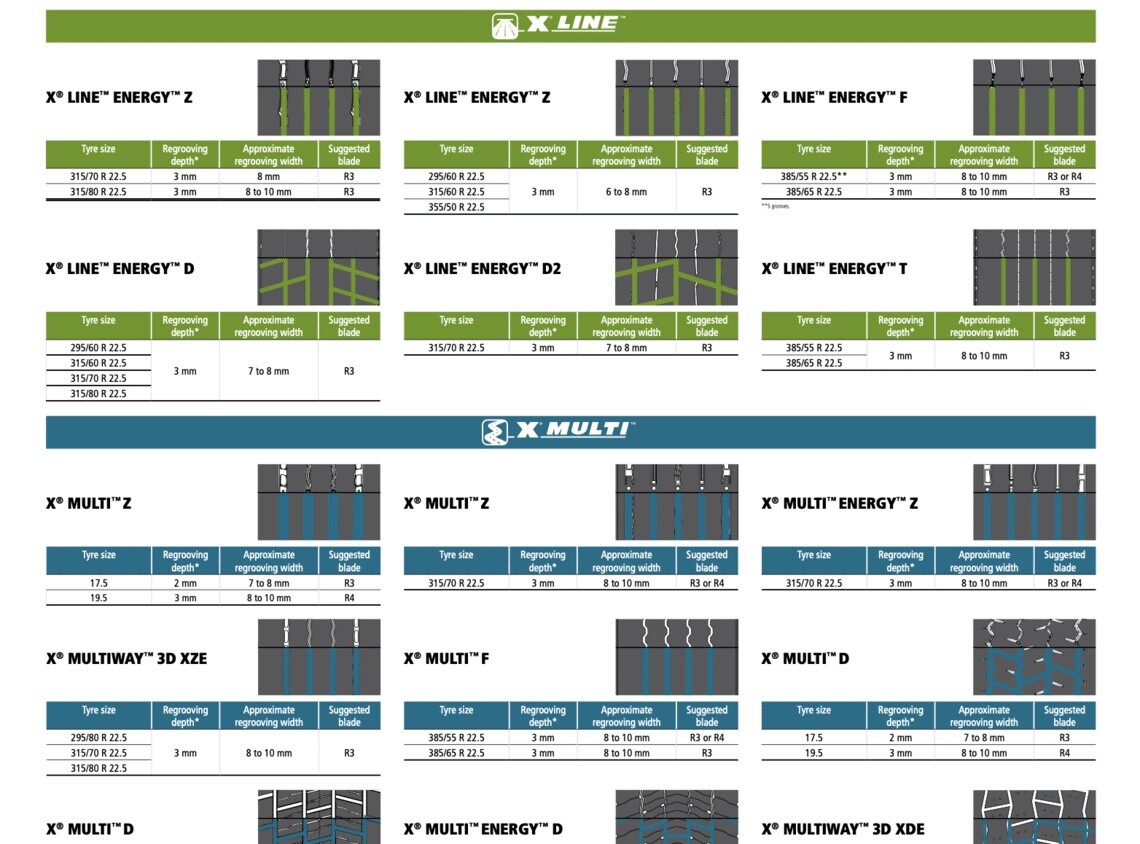
MICHELIN regroove patterns
TYRE REGROOVER TOOL,TO CALCULATE YOUR SAVINGS
Calculate your potential savings with our MICHELIN tyre regroover tool to start regrooving process!
THEY TALK ABOUT TRUCK TYRE REGROOVING
Now, it’s the time for those who have make the choice to regrooving tyres to tell us about their experience with the Michelin Multi-Life approach.
To watch this video, you'll have to accept some cookies from Youtube platform. Just click on the button below to open the cookie module.
Accept youtube cookiesDiscover the regroove testimonial of the Belgian company VAN MIEGHEM, specialising in goods transportation.
FREQUENTLY ASKED QUESTIONS
Regrooving involves removing rubber from the layer of existing rubber to restore tread pattern depth.
Regroovable MICHELIN tyres are marked with the word “REGROOVABLE”.
Regrooving Truck tyres is an operation authorised and recommended by E.T.R.T.O. and A.F.N.O.R. (standard NFR12714) for the safety and increase in performance which it brings about.
Car tyres are not marked "regroovable". This operation is therefore prohibited for these tyres.
Regrooving does not affect MICHELIN Remix retreading. The acceptance rate of MICHELIN Remix retreading is identical for a regrooved and non-regrooved MICHELIN tyre: 90 %.(5)
DISCOVER OUR RETREAD ARTICLES
(1) Compared to a worn, non-regrooved MICHELIN tyre. Information based on the recommendations made by the French tyre manufacturers’ federation (TNPF) in 2019, according to which the regrooving of worn tyres increases tyre life by using all the available rubber
(2)5.4% save in fuel consumption: internal study carried out at the Michelin test tracks in Ladoux (France) on 5 May 2021, under DEKRA supervision (report No. 21CPAEXT-030). For the comparison between new tyres and regrooved tyres (R5 mm), two identical Volvo FH500 trucks were used, fitted with 315/70 R 22.5 MICHELIN X® LINE ENERGY™ Z2 & D2 tyres and each towing a fully loaded (40 tonnes). Schmitz Cargobull trailer fitted with 385/55 R 22.5 MICHELIN X® LINE ENERGY™ T tyres at identical pressures (8.5 b, 7.5 b and 9.0 b). Results may vary depending on weather conditions, road type, tyre size and driving style.
(3) On wet ground, regrooved tyres offer approx. 10% greater transverse grip and traction compared to the same worn tyres. Internal study carried out by Michelin on a polished concrete track at Ladoux (France) in 2010; results may vary depending on the actual conditions of use.
(4) The CO2 savings from the Michelin multi-life model, are accentuated thanks to the fuel savings linked to regrooving (up to 5.4%(2)). According to a study under real conditions of use (using 315/70 R 22.5 tyres fitted to the drive and steering axles of a 4x2 truck used for international and national long distance, that have exceeded 50% wear), the average mileage for MICHELIN X® LINE ENERGY™ Z2 and MICHELIN X® LINE ENERGY™ D2 tyres is 232,200 km before regrooving* (*Michelin internal source and calculation, based on measurements taken by the Michelin teams during customer inspections on 488 axles, in Austria, Belgium, Croatia, the Czech Republic, France, Germany, Greece, Hungary, Italy, the Netherlands, Poland, Portugal, Romania, Serbia, Slovenia, Spain, and Turkey, over the period from 2020 to 2023), with a simulation based on the results collected suggesting extrapolation of the lifespan until 3 mm remains. The results may vary depending on the weather and road conditions. The view is that our tyres travel up to 25%(1) further thanks to regrooving, i.e. 58,050 km (232,200 x 25%). The fuel savings are calculated over the distance travelled by the regrooved tyres (58,050 km) at an average consumption of 29.5 L/100 km for new tyres and 27.91 L/100 km for regrooved tyres (source: DEKRA report No. 21CPAEXT-030). 29.5 x 5.4%, i.e., a saving of 1.59 L/100 km for an articulated truck and tri-axle trailer (thus 12 tyres) Consequently, there is a saving of 0.13 L/100 km per tyre (1.59 L/12), i.e., 0.13 L x 58,050 km/100 = 77 litres of fuel saved when driving on regrooved tyres, thus a saving of 77 litres of diesel x 3.24 kg of CO2 = 251 kg of CO2. The emissions factor of 3.24 kg of CO2 for 1 litre of diesel comes from the life cycle assessment conducted by ADEME for pure diesel. It includes emissions during the diesel production stages (17%) and during its combustion (83%). Source: ADEME. Base Empreinte, Étude Carbone, Version 22.0.0, 02/08/2022. Thus 77 x 3.24 kg of CO2 = 251 kg of CO2.
(5) Michelin study conducted on 1 million tyres provided for Michelin Remix retreading in 2008 and 2009. The difference in the approval rate between retreaded regrooved tyres and retreaded non-regrooved tyres is below 0.2%.




